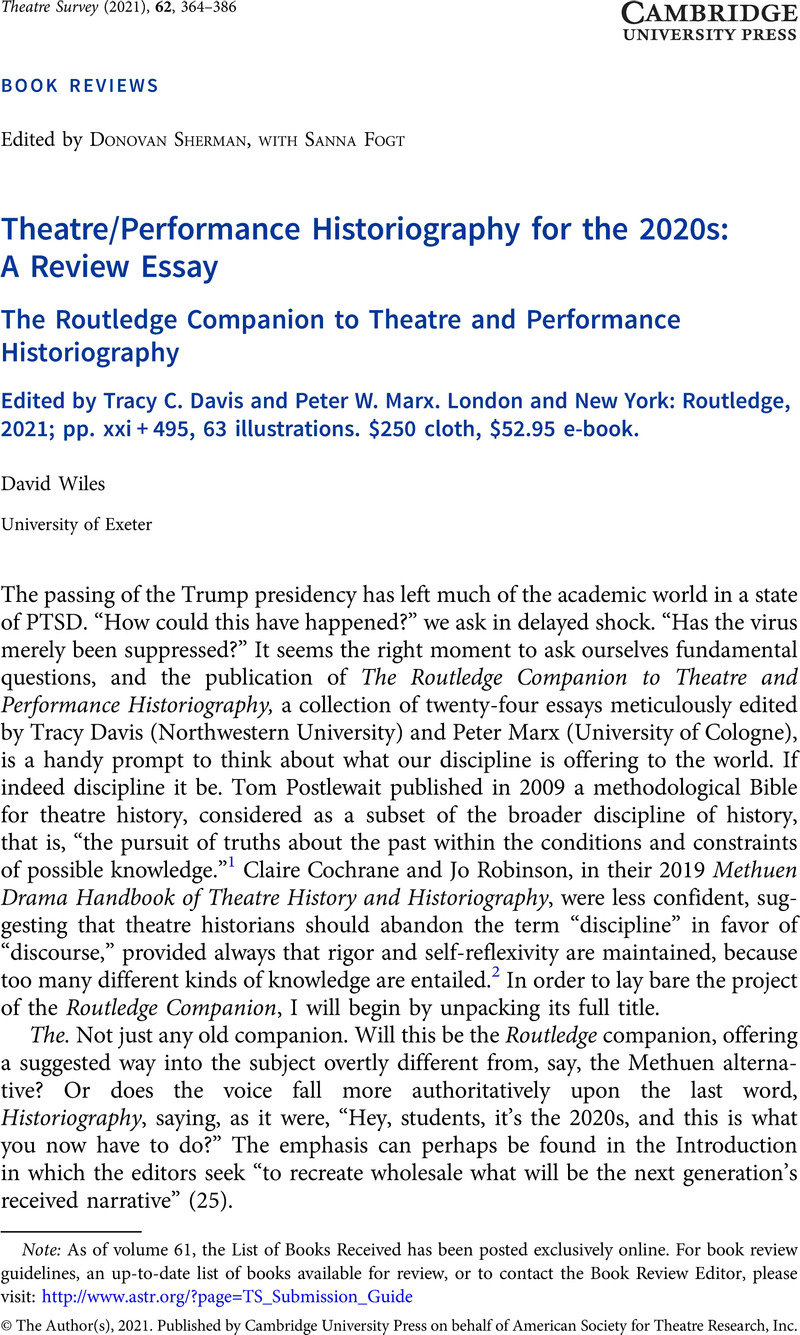No CrossRef data available.
Article contents
Theatre/Performance Historiography for the 2020s: A Review Essay - The Routledge Companion to Theatre and Performance Historiography Edited by Tracy C. Davis and Peter W. Marx. London and New York: Routledge, 2021; pp. xxi + 495, 63 illustrations. $250 cloth, $52.95 e-book.
Review products
Published online by Cambridge University Press: 03 August 2021
Abstract

- Type
- Book Reviews: Edited by Donovan Sherman, with Sanna Fogt
- Information
- Copyright
- Copyright © The Author(s), 2021. Published by Cambridge University Press on behalf of American Society for Theatre Research, Inc.
Footnotes
Note: As of volume 61, the List of Books Received has been posted exclusively online. For book review guidelines, an up-to-date list of books available for review, or to contact the Book Review Editor, please visit: http://www.astr.org/?page=TS_Submission_Guide
References
Notes
1 Postlewait, Thomas, The Cambridge Introduction to Theatre Historiography (Cambridge: Cambridge University Press, 2009), 1Google Scholar.
2 The Methuen Drama Handbook of Theatre History and Historiography, ed. Claire Cochrane and Jo Robinson (London: Bloomsbury Methuen Drama, 2019), 23–4.
3 Smith, Charles, Universal Geography Made Easy; or, A New Geographical Pocket Companion: comprehending, a description of the habitable world, with maps (New York: Wayland & Davis, 1795)Google Scholar. The Oxford Companions series got underway in 1932.
4 A Cultural History of Theatre, ed. Christopher B. Balme and Tracy C. Davis, 6 vols. (London: Bloomsbury Methuen Drama, 2017).
5 Erika Fischer-Lichte traces the autonomous German discipline of theatre studies back to the work of Max Herrmann in 1918 in The Routledge Introduction to Theatre and Performance Studies, ed. Minou Arjomand and Ramona Mosse, trans. Minou Arjomand (Abingdon, Oxon: Routledge, 2014), 12–13.
6 The Cambridge Companion to Theatre History, ed. Wiles, David and Dymkowski, Christine (Cambridge: Cambridge University Press, 2013)Google Scholar.
7 Tillis, Steve, The Challenge of World Theatre History (London: Palgrave Macmillan, 2020), 15–16CrossRefGoogle Scholar. I am grateful to Steve Tillis for sharing his work with me.
8 Carlson, Marvin, Performance: A Critical Introduction (1996; 3d ed., London: Routledge, 2017)Google Scholar. Compare a more theatre-oriented UK frame of reference in Thinking through Theatre and Performance, ed. Maaike Bleeker et al. (London: Bloomsbury Methuen Drama, 2019). The Routledge Companion to Theatre, Performance and Cognitive Science, ed. Rick Kemp and Bruce McConachie (London: Routledge, 2019) likewise works with a more theatre-related definition.
9 Woolf, Daniel, A Global History of History (Cambridge: Cambridge University Press, 2011), 18Google Scholar, emphasis in original.
10 See Latour, Bruno, “Why Has Critique Run out of Steam? From Matters of Fact to Matters of Concern,” Critical Inquiry 30.2 (2004): 225–48CrossRefGoogle Scholar.
11 Academic debate about this term was triggered by Rustom Bharucha's essay “Notes on the Invention of Tradition” in his Theatre and the World: Performance and the Politics of Culture (1990; London: Routledge, 1993), 193–211.
12 Chakrabarty, Dipesh, Provincializing Europe: Postcolonial Thought and Historical Difference (2000; new ed., Princeton: Princeton University Press, 2007)Google Scholar.
13 These comments are from a podcast of 2018 based on a lecture at Australian National University; see “The Knowledge We Value: Dipesh Chakrabarty Talks the Contentious Politics of Knowledge Production,” The Familiar Strange, 4 February 2018, https://thefamiliarstrange.com/2018/02/04/ep-7-dipesh-chakrabarty/, accessed 17 May 2021.
14 Cohn, Bernard S., “History and Anthropology: The State of Play,” Comparative Studies in Society and History 22.2 (1980): 198–221CrossRefGoogle Scholar.
15 London, John, “The Uncertainty of Fascist Aesthetics: Political Ideology and Historical Reality,” Culture, Theory and Critique 42.1 (1999): 49–63, at 53Google Scholar.
16 Chakrabarty, Dipesh, “The Climate of History: Four Theses,” Critical Inquiry 35.2 (2009): 197–222CrossRefGoogle Scholar. For a pioneering essay in theatre studies, see McConachie, Bruce, “Ethics, Evolution, Ecology, and Performance,” in Readings in Performance and Ecology, ed. Arons, Wendy and May, Theresa J. (New York: Palgrave Macmillan, 2012), 91–100CrossRefGoogle Scholar. The topic is placed on the international theatre studies agenda in Lisa Woynarski et al., “Dossier: Climate Change and the Decolonized Future of Theatre,” Theatre Research International 45.2 (2020): 179–208.
17 See What Is Adaptive about Adaptive Memory?, ed. Bennett L. Schwartz et al. (Oxford: Oxford University Press, 2014).
18 Stoller, Paul, Sensuous Scholarship (Philadelphia: University of Pennsylvania Press, 1997), xviCrossRefGoogle Scholar.
19 Nelson, Robin, “Practice-as-Research and the Problem of Knowledge,” Performance Research 11.4 (2006): 105–16CrossRefGoogle Scholar.




